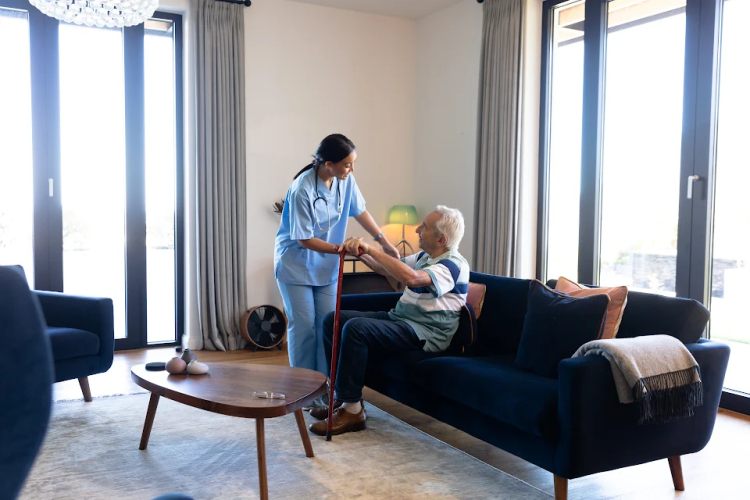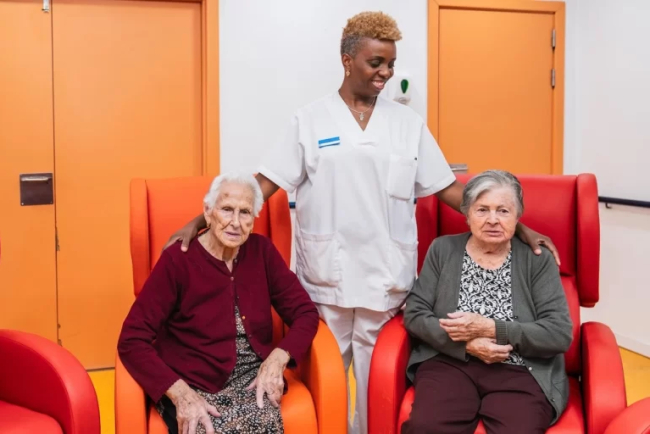How Home Care Services Improve Quality of Life for the Seniors
Discover how professional home care services enhance seniors’ quality of life through personalized support, companionship, and comfort in familiar surroundings.

India's senior population is growing, and families are seeking support that feels personal—not clinical. Professional elderly home care brings qualified help to the doorstep, so seniors receive assistance without leaving the comfort of familiar surroundings. Unlike institutional settings, home care services for the elderly are built around daily routines, cultural preferences, and health needs, allowing older adults to stay independent and respected. A practical home care services list typically includes personal care, nursing support, medication reminders, physiotherapy, dementia care, and respite for families. Done well, senior care at home reduces hospital visits, improves nutrition and sleep, and restores confidence through steady companionship. The outcome is tangible: better safety, stronger emotional health, and a higher quality of life for seniors. Here's how professional home care services enhance the overall quality of life for elderly individuals.
Promoting Independence and Dignity
Independence begins with choice. In-home caregivers structure support around the senior's own routine—wake-up time, prayer, bathing, meals, rest, and hobbies—so help never feels intrusive. Personalised care plans document preferences such as diet, mobility aids, language, and privacy norms, and set practical goals (walk 500 steps daily, bathe safely, take medications on time). Small assists—buttoning shirts, setting out clothes, preparing light meals—let elders do what they can while receiving just the right lift.
Caregivers also coach "do-with, not do-for." They cue, supervise, and encourage rather than taking over, preserving dignity and self-worth. When needed, they adapt the environment: grab bars, non-slip mats, clear pathways, labelled drawers, and phone/door alerts. Because support happens in familiar surroundings, seniors experience less anxiety and confusion, especially after hospital discharge or with memory changes. Familiar smells, prayers, photos, and neighbourhood sounds anchor identity. The result is greater confidence, safer daily living, and a respectful balance: elders stay in charge of decisions while receiving dependable help for tasks that challenge them.
Physical Health and Safety at Home
Professional caregivers keep health tasks simple and safe. They organise pill boxes, set reminders, and track side-effects so medicines are taken on time and as prescribed. For mobility, they help with transfers, supervised walks, and the correct use of walkers or canes, and build strength with light exercises approved by the doctor. Fall prevention is part of every visit: checking footwear, clearing clutter, drying wet floors, adding night lights, installing grab bars, and teaching safe bathroom routines.
Healing at home is often more comfortable than in a hospital: home-cooked food, calm surroundings, and uninterrupted sleep support immunity and faster recovery. With home care services for the elderly, families get practical safety and reassurance, while seniors maintain comfort and stability—key to a better quality of life.
Emotional and Mental Well-being
Loneliness is one of the strongest risk factors for poor health in older adults. Trained caregivers provide steady companionship—conversation over tea, shared prayers, reminiscence, light games, neighbourhood walks—that lifts mood and restores purpose. Regular, human contact reduces anxiety and lowers the likelihood of depression, while predictable routines stabilise sleep and appetite. Caregivers also notice subtle changes in energy, memory, or behaviour and flag them early so that families can seek timely assessment.
Emotional support extends beyond talk. Gentle encouragement to call a friend, attend a local satsang, or video-chat with grandchildren keeps social bonds alive. For seniors with dementia or Parkinson's, caregivers use validation, redirection, and calm cues to reduce agitation and confusion. Simple sensory comforts—music from their era, favourite meals, a tidy puja corner—anchor identity and soothe stress.
This blend of companionship, structure, and small joys builds resilience. With elderly home care, seniors feel seen and respected at home, and families see a visible lift in confidence, engagement, and overall quality of life for seniors.
Personalised Care and Attention
Home nursing services in Bangalore is one-on-one, so every minute serves the senior's goals. Caregivers begin with an assessment—health history, mobility, diet, sleep, pain levels, and daily habits—then design a simple plan with clear priorities (safe bathing, timely meds, 10–15 minutes of walking, balanced meals). Pace is set by the elder, not the clock. Notes are kept after each visit—vitals, appetite, mood, and exercise—so families and doctors can see steady progress.
Support adapts to each condition. For dementia, caregivers use short instructions, calm routines, and familiar cues to reduce confusion. For Parkinson's, they schedule tasks during "on" periods, assist with balance, and use swallow-safe meal strategies. Post-surgery, they follow wound-care protocols, watch for infection, and coordinate follow-ups. If needs rise, the plan scales from hourly to full-time care.
This tailored attention turns elderly home care into measurable outcomes: fewer setbacks, more confidence, and a safer, calmer day at home.
Support for Family Members
Caring for an ageing parent is rewarding but exhausting. Professional elderly home care eases the load by sharing daily tasks—bathing support, meal prep, medication reminders, vitals tracking, and safe mobility—so families aren't on duty 24/7. Respite shifts let primary caregivers rest, work, or travel without guilt. Clear care plans, checklists, and a medication chart keep everyone aligned, while WhatsApp updates and supervisor calls provide timely visibility. Care teams also coordinate doctor visits, lab tests, and therapy sessions, arrange transport, and maintain supplies such as adult pads, wound dressings, and glucometer strips. In a crisis, caregivers follow an agreed escalation path and alert the family promptly. Because staffing is vetted and backed up, there's continuity when someone is unwell or on leave. This level of senior care at home means families spend more quality time—talking, praying, eating together—instead of managing tasks, with genuine peace of mind from reliable, professional support at home.
Encouraging Active Living and Engagement
Active living starts with small, enjoyable routines. Caregivers design a simple daily plan—doctor-approved walks, range-of-motion stretches, chair yoga, and breathing exercises—so movement feels safe and doable. Hobbies return to the schedule: light gardening, bhajans, reading aloud, simple cooking, board games, and craft work. For cognition, they use puzzles, memory cards, newspaper summaries, and reminiscence exercises, pairing tasks with music to lift mood.
Social engagement is built in: phone/video calls with family, visits to the temple or park, and short chats with neighbours. Purposeful micro-tasks—watering plants, folding laundry, organising photos—restore a sense of contribution.
Caregivers track small wins (steps walked, pages read), offer choices, and pace activities around energy levels. With this structure, elderly home care keeps minds sharp and bodies moving; senior care at home helps seniors stay connected, optimistic, and independent—improving the overall quality of life for seniors.
Cost-Effectiveness Compared to Institutional Care
Home care often costs less than long hospital stays or residential nursing, mainly because families pay only for the hours and skills required. There are no room or facility overheads, and flexible packages—hourly, day shifts, night duty, 12-hour or 24-hour care—let families scale support up or down. Costs align to need: personal care attendants for daily living; nurse visits for injections, wound care, IVs; physiotherapy on scheduled days. By preventing falls, medication errors, and avoidable readmissions, home care reduces downstream bills. Add in indirect savings—fewer travel trips, caregiver time off work, and less disruption to family routines—and the total outlay is often lower while outcomes remain strong. Families control budgets without compromising safety or dignity at home.
Explore: Personalised healthcare
Conclusion
Home care brings comfort, safety, and dignity together in the place seniors value most—their own home. With personalised routines, vigilant health monitoring, and warm companionship, daily life becomes easier and more meaningful. Families gain relief and confidence, while elders stay independent, active, and emotionally connected. From medication support and fall prevention to memory-friendly cues and gentle exercise, professional elderly home care turns small, consistent actions into measurable gains in wellbeing. The result is fewer setbacks, better moods, and a higher quality of life for seniors—without the stress of institutional settings. Looking for compassionate elderly care at home? Choose trusted caregivers who prioritise comfort, dignity, and companionship.
What's Your Reaction?
















